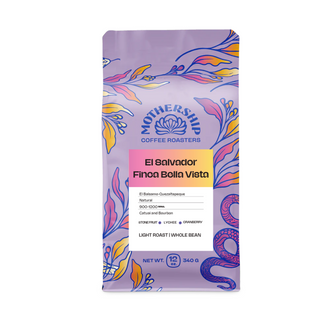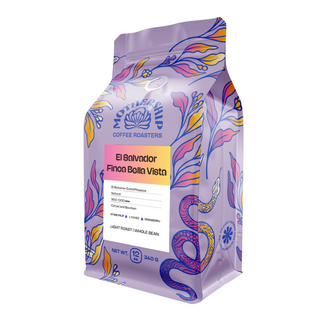Owner: Terence Moore Alfaro
Farm: Finca Bella Vista
Farm Size: 65 Hectares
Region: El Balsamo-Quezaltepeque
Process: Natural
Elevation: 900 - 1200 masl
Variety: Catuai and Bourbon
Flavor Notes: Stone Fruit - Lychee - Cranberry
Roast Level: Light
Background:
In the late 1800s, coffee finally reached the shores of the small but mighty country of El Salvador. The crop arrived when the leading export indigo lost its prominence on the market. Coffee soon spread to massive estates, owned by wealthy individuals who forced peasants to give up their own land in order to work and assist with the tasks associated with the estates.
Thanks to the prominence of coffee and the wealth involved with coffee production – roads and infrastructure were constructed to ensure ease of trade. Facilities such as mills were also built to make the production of coffee smooth. With this support from the richest people in El Salvador, the country was responsible for a significant portion of the world’s global production of coffee. Specifically, in the 1920s, coffee represented 90% of the country’s exports, and El Salvador climbed the ladder to become the fourth largest producer of coffee in the world by the 1970s.
However, in 1979, a civil war broke out, causing the abandonment of a huge portion of the coffee farms in the country. El Salvador struggled to maintain its exports during this time, until the war dissolved in 1992. Although the war ravaged the country for over a decade, it led to important land reforms that redistributed land to smallholder producers. Thanks to these efforts, today, nearly 95% of coffee is grown by smallholders who own less than 20 hectares. Today, families prevail and support each other in the small country that is still in recovery. Challenges range from struggles with coffee leaf rust and difficulties locating work. But thanks to support and strong producers, these challenges are being overcome.
In the mountain range of El Balsamo-Quezaltepeque on the northern slopes of the San Salvador volcano is Finca Bella Vista, a farm that has been in the Alfaro family, a prominent producing-family in El Salvador, for four generations. Currently, the farm is owned and managed by Terence Moore Alfaro.
The 65 hectares have sandy loam soils and grow Bourbon, Catuaí, Pacas and Pacamara. The coffee here grows under diverse shade such as are Ingas, Paraiso, Balsamo, Cedars, and various fruit trees. The shade allows for a slower maturation of the coffee, helping to improve the quality.
At Finca Bella Vista, the soils are carefully monitored, with nutritional programs in place to help the soil recover and maintain nutrients. This is done via a sustainable phytosanitary program and biologicals to introduce to the soil to improve soil microbial ecosystems. This in turn, creates healthy soil that is better able to support coffee production.
During the harvest at Finca Bella Vista, the cherries are carefully handpicked and delivered to the wet mill located in the farm. The cherries are sorted, then placed in sealed containers to ferment for 96 hours. Afterwards, the cherries are delivered to the El Carmen mill to be dried on clay patios for 22 – 25 days until the ideal moisture content is reached. Once dried, the cherries are hulled and prepared for export.
Owner: Terence Moore Alfaro
Farm: Finca Bella Vista
Farm Size: 65 Hectares
Region: El Balsamo-Quezaltepeque
Process: Natural
Elevation: 900 - 1200 masl
Variety: Catuai and Bourbon
Flavor Notes: Stone Fruit - Lychee - Cranberry
Roast Level: Light
Background:
In the late 1800s, coffee finally reached the shores of the small but mighty country of El Salvador. The crop arrived when the leading export indigo lost its prominence on the market. Coffee soon spread to massive estates, owned by wealthy individuals who forced peasants to give up their own land in order to work and assist with the tasks associated with the estates.
Thanks to the prominence of coffee and the wealth involved with coffee production – roads and infrastructure were constructed to ensure ease of trade. Facilities such as mills were also built to make the production of coffee smooth. With this support from the richest people in El Salvador, the country was responsible for a significant portion of the world’s global production of coffee. Specifically, in the 1920s, coffee represented 90% of the country’s exports, and El Salvador climbed the ladder to become the fourth largest producer of coffee in the world by the 1970s.
However, in 1979, a civil war broke out, causing the abandonment of a huge portion of the coffee farms in the country. El Salvador struggled to maintain its exports during this time, until the war dissolved in 1992. Although the war ravaged the country for over a decade, it led to important land reforms that redistributed land to smallholder producers. Thanks to these efforts, today, nearly 95% of coffee is grown by smallholders who own less than 20 hectares. Today, families prevail and support each other in the small country that is still in recovery. Challenges range from struggles with coffee leaf rust and difficulties locating work. But thanks to support and strong producers, these challenges are being overcome.
In the mountain range of El Balsamo-Quezaltepeque on the northern slopes of the San Salvador volcano is Finca Bella Vista, a farm that has been in the Alfaro family, a prominent producing-family in El Salvador, for four generations. Currently, the farm is owned and managed by Terence Moore Alfaro.
The 65 hectares have sandy loam soils and grow Bourbon, Catuaí, Pacas and Pacamara. The coffee here grows under diverse shade such as are Ingas, Paraiso, Balsamo, Cedars, and various fruit trees. The shade allows for a slower maturation of the coffee, helping to improve the quality.
At Finca Bella Vista, the soils are carefully monitored, with nutritional programs in place to help the soil recover and maintain nutrients. This is done via a sustainable phytosanitary program and biologicals to introduce to the soil to improve soil microbial ecosystems. This in turn, creates healthy soil that is better able to support coffee production.
During the harvest at Finca Bella Vista, the cherries are carefully handpicked and delivered to the wet mill located in the farm. The cherries are sorted, then placed in sealed containers to ferment for 96 hours. Afterwards, the cherries are delivered to the El Carmen mill to be dried on clay patios for 22 – 25 days until the ideal moisture content is reached. Once dried, the cherries are hulled and prepared for export.



